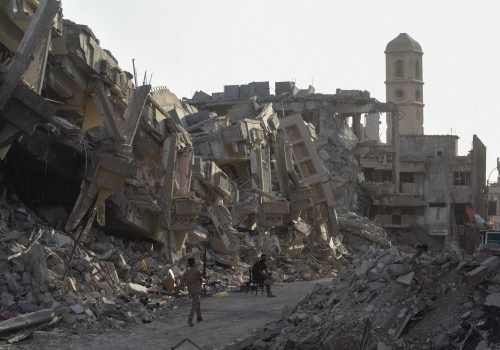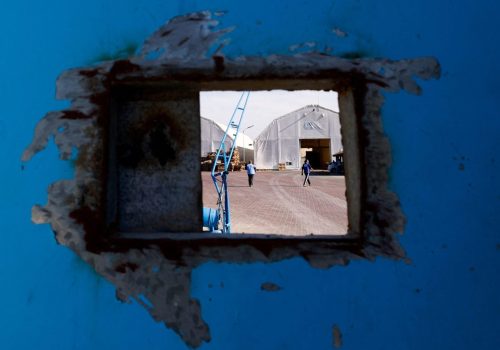Opposition to Israel’s war for survival fails to understand Hamas’s goals
If, during a protest against Israel, you chant, “From the river to the sea, Palestine will be free,” then you are ultimately calling for the destruction of Israel, echoing a goal of Hamas, not the Palestinian cause. If you are a college president who, without hesitation or equivocation, does not immediately denounce “calling for the genocide of Jews,” then you are passively but inexorably facilitating anti-Semitism, echoing a goal of Hamas, not the Palestinian cause. If you’re a college student who supports the “martyrdom” of Hamas or intentionally intimidates pro-Israel and Jewish students, then you are echoing a goal of Hamas, not the Palestinian cause.
Watching global protests against Israel for the last ten weeks—and seeing hundreds of thousands, perhaps millions, give credence to these views—reflects a cognitive dissonance that is prompting some to innocently mistake, and others to willfully ignore, the primary motivation behind Hamas’s October 7 terrorist attack, which also happens to be the key driver behind Israel continuing its military operations.
Hamas does not want a two-state solution. Hamas does not want Israel to normalize relations and have peace with Arab states.
Recently, I had lunch with a senior official from an Arab country who told me that there’s no excuse for the attack, but it should be understood as an “act of desperation.” Morocco’s largest political party, the Justice and Development Party, called the terrorist attack “a natural and legitimate reaction.” Iraqi Prime Minister Mohammed Shia’ al-Sudani referred to the attack as a “natural result” of Israeli policies. Hamas’s attack “didn’t happen in a vacuum,” United Nations Secretary-General António Guterres said two weeks after the attack.
All of these sentiments mistake Hamas’s fundamental goals for those of the majority of Palestinians. Hamas does not want a two-state solution. Hamas does not want Israel to normalize relations and have peace with Arab states. Hamas does not want responsibility for its governance failures in Gaza.
I support the creation of an independent and sovereign Palestinian state side-by-side with Israel. Hamas’s October 7 terrorist attack set back that cause for the Palestinian people; it didn’t advance it.
Hamas’s own charter—and not the original 1988 explicitly anti-Semitic version, but the implicitly anti-Semitic 2017 document that, like the original, calls for the destruction of Israel—makes clear in the group’s own words that its goals are not compatible with that of a two-state solution. Those who think that Hamas would support such an accommodation misunderstand the primary reason for the October 7 massacre.
Superseding all of the aforementioned motivations, some of which account for the timing of the attack, is Hamas’s core driver: to obliterate Israel and kill Jews. Full stop. No context, addendums, or false moral equivalency should distract from that fundamental fact.
There is a tendency among some prominent officials and followers of the region to condemn the October 7 attack but also claim that one has to understand the drivers that led to it, and not focus on the attack itself, which continues to traumatize Israelis. This tendency creates despair and fear for those connected to Israel and in the global Jewish community, which recognizes in Hamas’s ideology and founding documents the same genocidal intent as that of the Nazis.
And that is why Israel is not going to agree to a permanent cease fire now.
I join the many who have concerns about Israel’s lack of a long-term strategy and some of its tactics, given the horrific toll of death and destruction in Gaza. Israel should do everything possible to enable humanitarian corridors, and the opening of the Kerem Shalom crossing on December 15 is a positive step. And Israel should continue to negotiate for additional humanitarian pauses of military operations—even as Hamas rejects such offers—in order to allow more aid to flow into Gaza.
But calls for an immediate and permanent ceasefire, beyond humanitarian pauses, are implicitly advocating for a Hamas victory and demanding Israel accommodate the terrorists next door who just slaughtered its citizens and want to annihilate the state of Israel. No other country in the world would be expected to do that.
Israel may not be able to completely destroy Hamas given that its ideology will survive to inspire some. But Israel can decimate Hamas’s military capabilities, leadership, and infrastructure to mitigate the immediate and medium-term threat of the terrorist organization to all Israelis, Jews, and Arabs.
There is no good solution to the current conflict; it is a question of survival. What is happening in Gaza to the civilian population is a tragedy, and innocent Palestinians are simply trying to survive. What happened in Israel on October 7 and the continuing destruction from rockets fired by Hamas and Hezbollah (and even the Houthis) is also a tragedy, and Israel’s military operations are about trying to ensure Israel’s own survival as well.
The only thing not debatable: Both Israelis and Palestinians will be safer and far more likely to survive without Hamas’s tyrannical rule over Gaza.
Jonathan Panikoff is the director of the Scowcroft Middle East Security Initiative in the Middle East Program. He is a former deputy national intelligence officer for the Near East at the US National Intelligence Council.
The views expressed in this publication are the author’s and do not imply endorsement by the Office of the Director of National Intelligence, the Intelligence Community, or any other US government agency.
Further reading
Tue, Dec 19, 2023
Israeli President Herzog: ‘An amalgamation of forces’ will likely govern post-conflict Gaza
New Atlanticist By
The Israeli president also confirmed that Israel would be willing to pause fighting in Gaza again in exchange for hostages.
Wed, Nov 15, 2023
I covered the battle against ISIS in Mosul. Gaza’s challenges will make it look like child’s play.
MENASource By Arwa Damon
If there is something to be drawn from those lessons, it is that what Israel is doing right now will secure anything but peace and stability.
Tue, Oct 24, 2023
The global consequences of the Israel-Hamas war are just beginning. Here’s what to watch.
The Big Story By Kirsten Fontenrose
It's hard to predict what decisions the players will make tomorrow, but here are the early warning signs that could indicate what will come next in the Middle East and beyond.
Image: A woman holds a sign with the controversial phrase, "from the river to the sea," at a Washington, DC rally demanding a ceasefire for Palestine. The event was one of hundreds of protests worldwide demanding an end to the bombing of civilians in retaliation for the Hamas terror attacks that killed 1,400 Israelis on October 7, 2023. (Photo by Allison Bailey/NurPhoto)


